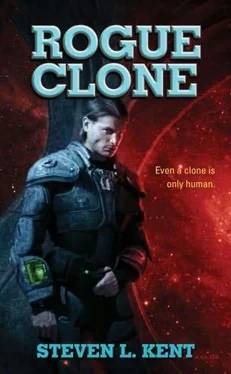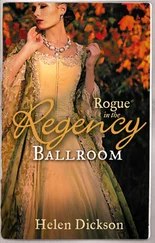Steven Kent - Rogue Clone
Здесь есть возможность читать онлайн «Steven Kent - Rogue Clone» весь текст электронной книги совершенно бесплатно (целиком полную версию без сокращений). В некоторых случаях можно слушать аудио, скачать через торрент в формате fb2 и присутствует краткое содержание. Жанр: Боевая фантастика, на английском языке. Описание произведения, (предисловие) а так же отзывы посетителей доступны на портале библиотеки ЛибКат.
- Название:Rogue Clone
- Автор:
- Жанр:
- Год:неизвестен
- ISBN:нет данных
- Рейтинг книги:3 / 5. Голосов: 1
-
Избранное:Добавить в избранное
- Отзывы:
-
Ваша оценка:
- 60
- 1
- 2
- 3
- 4
- 5
Rogue Clone: краткое содержание, описание и аннотация
Предлагаем к чтению аннотацию, описание, краткое содержание или предисловие (зависит от того, что написал сам автор книги «Rogue Clone»). Если вы не нашли необходимую информацию о книге — напишите в комментариях, мы постараемся отыскать её.
Rogue Clone — читать онлайн бесплатно полную книгу (весь текст) целиком
Ниже представлен текст книги, разбитый по страницам. Система сохранения места последней прочитанной страницы, позволяет с удобством читать онлайн бесплатно книгу «Rogue Clone», без необходимости каждый раз заново искать на чём Вы остановились. Поставьте закладку, и сможете в любой момент перейти на страницу, на которой закончили чтение.
Интервал:
Закладка:
Stepping out into the corridor, I saw the crewman moving away slowly. He stood hunched over the laundry cart, his head turning to follow everyone he passed. He turned down one hall and then another before reaching his final destination.
Capital ships had more than one laundry facility. Chances were, there was a special facility on the upper decks just for cleaning officers’ uniforms; but this laundry would do.
I approached and the door slid open.
“What do you want?” the crewman asked as I stepped into the room.
“My clothes,” I said, doing an impersonation of a peeved officer. “You hauled off my uniform in one of your laundry carts.”
“Sorry,” the man said in a flat voice. He went back to sorting dirty clothes and did not look back in my direction. Such insubordination. I was an officer. He was an enlisted man. Okay, I was a spy pretending to be an officer, but he didn’t know that.
I had at least thirty carts to choose from. In the third cart, I found an officer’s work uniform.
CHAPTER THIRTY
I went to the emptiest room on any battleship—the chapel. There I could speak freely.
“Who is Derrick Hines?” Freeman’s face appeared on my MediaLink shades.
“Never heard of him,” I said.
“You’re using his Link address,” Freeman said.
“Oh, him,” I said. “He was a crewman on a GCF ship.”
“Confederate or Mogat—?” Freeman asked. He had no interest in Hines’s fate.
Freeman was on a communications console. I could see his face. It was as impassive as ever. Judging by his nonplussed expression, you might have thought that I had called from a bar in Mars Spaceport.
“No idea,” I said. “I think it’s their flagship.”
“How did you get on?” Freeman asked.
“I followed Colonel Wingate, the commander of Fort Clinton.”
“That was the Army base that got destroyed on New Columbia,” Freeman said. “What’s he doing on a GCF ship?”
“He swapped sides,” I said. “Turns out he was using Fort Clinton as a surplus outlet and the Mogats were his favorite customers. Think he’s worth much?”
As I thought about it, I had plenty of reasons to hate Batt Wingate. He would have sold me out without a second thought when I was regular military. He’d certainly sold out enough other clones. He must have helped William Patel smuggle bombs into Safe Harbor. Did he know that I would be there or was he just after Jimmy Callahan? I would gladly kill the man myself if I got a chance.
“He’s worth something,” Freeman said. “The Mogats routed the Navy at New Columbia. They shot down twenty-three U.A. ships and destroyed all three military bases. The pundits are saying that Washington is desperate.
“Have you got a location on the Fleet?”
“No,” I said.
Freeman waited for me to say more.
“Ray, this is too big for us. We’re going to need to bring Huang in on it. Keep this channel open. I don’t know how I’m going to do it yet, but I will get you a location. Once I have something, you’re going to have to turn it over to Huang.”
He agreed.
“Where are you now?” I asked.
“I was on my way to Little Man.”
“Your family okay?” I asked.
“A carrier buzzed them last night. I think it scared them. They’re colonists. Having the Navy around makes them nervous.”
“Did anything happen?” I asked.
“The captain gave them one month to evacuate the planet. They’ll still be there when this is over with.” For some reason, I got the feeling that he was not anxious to visit Little Man. Until recently, he never even mentioned his family. Now, when he talked about them, he did not seem to exude warm feelings.
We agreed to meet in Safe Harbor once I got off this ship. Freeman would go and see what happened to Callahan and the commandant at Fort Washington. One way or another, I thought I could bring in Batt Wingate, and we would need witnesses to prove he was our Benedict Arnold.
My new uniform made me a lieutenant in the Confederate Navy. Now that I was an officer, I moved around the ship more freely. I walked the halls and looked for clues.
The first thing that struck me was the sheer emptiness of the ship. U.A. ships were crowded with personnel. Engineers, weapons officers, cooks, communications officers …wherever you looked, you saw sailors. Command ships seemed doubly crowded because, along with the crew, they had fleet officers and administrative flunkies.
This ship had a skeleton crew, maybe a half-crew. I walked down major arteries between engineering and weapons systems passing only an occasional sailor.
The ship itself was clean, brightly lit, and remarkably unorganized. The cables that I saw lining the walls down in the landing bay also snaked along the halls on the upper decks. They were about three inches in diameter and highly insulated, which led me to believe that they might carry a high-voltage electrical charge. The ceilings in this part of the ship were only eight feet tall, and the cables hung one foot lower than that. At one point, thinking I was alone in a long hall, I stopped to examine them. The outside covering of these cables was black with maroon strips.
“Is there a problem with the cables, Sir?” somebody asked behind my back.
I whirled around expecting to see an MP. It was a petty officer—a maintenance technician. I recognized the crossed hammers insignia on his blouse. It was the same insignia that the U.A. Navy used. This man did not suspect me of being a spy. He was worried about my spotting a flaw in the way that the cables were hung.
“Looks sound,” I said.
He saluted, but he had a curious, maybe even slightly nervous look on his face. “Sir,” he said, looking as if he was not sure he should continue. I thought I knew what he would say and I was ready.
“Yes?”
Now lowering his voice to a whisper, he leaned forward and said, “You forgot your bars.” As he said this, he pinched the right side of his collar between his thumb and forefinger and shook it.
That was not what I expected. I pretended to be confused. Seeing that there were no bars on my collar, I acted surprised and embarrassed. “Thank you. I can’t believe I missed that,” I said with an expression that I hoped looked like a nervous grin. The petty officer saluted and left.
Of course there were no bars pinned to my collar, I had liberated this blouse from laundry. No officer worth his spit would leave his bars or clusters on the collar of a blouse that was headed for a cleaning.
My first discovery was that this ship was a battleship. I found that out when I passed a directory on the top deck. The directory showed the ship’s seven decks plus a picture of the ship from the outside. A ship of this size should have had a 2,500-man crew. Now, having walked its length on every deck, I guessed the crew at no more than 800. Maybe one-tenth of the crew was Japanese. The engineering area was almost all Japanese.
The Japanese officers made no attempt to fit in with the other sailors that I saw. Most of the men on this battleship wore tan-colored uniforms. The Japanese uniforms were dark blue. Still, Japanese officers spoke English whether talking to other officers or just among themselves.
The closer I came to the command deck, the more this ship looked Japanese. Not far from the directory, on the command deck, stood an archway made of two posts topped by two beams. Under the arch was a shrine or display with three long swords stretched across a three-tiered pedestal. Since the officers I saw walk past this shrine did not stop to bow or pray to it, I decided the display had more to do with heritage than religion.
I continued toward the bridge, passing through officer country and the maze of cubicles and offices that occupies the top deck of almost any naval ship. Here I walked with a businesslike stride, acting as if I had an important meeting to attend. On a U.A. Navy ship, someone would have noticed the missing bars. I would have been stopped and questioned. On this ship, few people noticed how I dressed.
Читать дальшеИнтервал:
Закладка:
Похожие книги на «Rogue Clone»
Представляем Вашему вниманию похожие книги на «Rogue Clone» списком для выбора. Мы отобрали схожую по названию и смыслу литературу в надежде предоставить читателям больше вариантов отыскать новые, интересные, ещё непрочитанные произведения.
Обсуждение, отзывы о книге «Rogue Clone» и просто собственные мнения читателей. Оставьте ваши комментарии, напишите, что Вы думаете о произведении, его смысле или главных героях. Укажите что конкретно понравилось, а что нет, и почему Вы так считаете.












